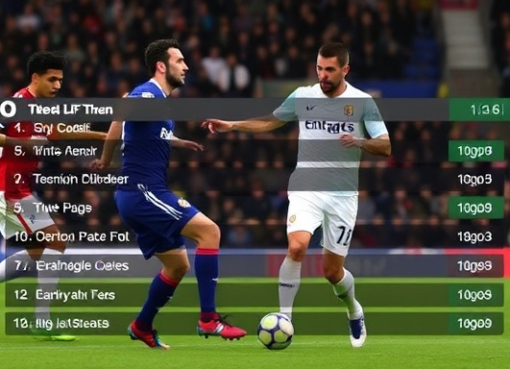Navigating the EFL: A Guide to Fixtures and Beyond

The English Football League (EFL) is a professional league system comprising three divisions: the Championship, League One, and League Two. It’s a hotbed of talent, passion, and fierce competition, captivating fans worldwide. This guide will help you navigate the intricate world of EFL fixtures and more.
Understanding the EFL Structure
The EFL is a pyramid structure, with promotion and relegation between the divisions.
Championship: The second tier of English football, often referred to as the Championship, is a highly competitive league with clubs aiming for promotion to the Premier League.
League One: The third tier, League One, is a mix of established clubs and ambitious
newcomers.
League Two: The fourth tier, League Two, is where many young talents emerge and clubs fight for promotion to League One.
How to Find EFL Fixtures
There are several reliable sources to find the latest EFL fixtures:
Official EFL Website: The official EFL website is the most accurate source for fixture information. It provides detailed schedules, live scores, and match statistics.
Football Websites and Apps: Popular football websites and apps like BBC Sport, Sky Sports, and the official Football League app offer comprehensive fixture information.
Social Media: Many clubs and fans share fixture updates on social media platforms like Twitter and Facebook.
Factors Affecting Fixture Changes
Several factors can influence changes to the EFL fixture list:
Weather Conditions: Adverse weather conditions can lead to postponements or rescheduling of matches.
International Breaks: Fixtures may be rescheduled to accommodate international football
commitments.
TV Coverage: If a match is selected for live television coverage, its kick-off time might be changed to accommodate broadcast schedules.
Why Follow EFL Fixtures?
There are numerous reasons to follow EFL fixtures:
Supporting Local Football: By following your local team, you can contribute to the growth and success of non-league football.
Discovering Hidden Gems: The EFL often produces talented players who go on to play at higher levels.
Exciting Atmosphere: EFL matches offer a unique and passionate atmosphere, making them a great experience for fans.
Betting Opportunities: Many fans enjoy betting on EFL football, and following fixtures can help you make informed decisions.
Tips for Enjoying EFL Football
Attend Matches: Nothing beats the atmosphere of a live football match.
Follow Your Favorite Teams: Choose a team to support and follow their progress throughout the season.
Engage with the Community: Join online forums and social media groups to discuss the league with other fans.
Stay Updated: Keep up-to-date with the latest news, fixtures, and results.
The Future of the EFL
The EFL continues to evolve, with clubs striving for success and fans passionately supporting their teams. With talented players, dedicated managers, and passionate supporters, the EFL is poised for an exciting future.
FAQs
What are EFL fixtures?
EFL fixtures refer to the schedule of football matches organized by the English Football League (EFL), which encompasses three tiers of English football below the Premier League: the Championship, League One, and League Two. These fixtures detail when and where each club in the respective leagues will play their home and away matches throughout the season. The EFL calendar includes regular league games, playoff matches, and cup competitions like the Carabao Cup (EFL Cup) and the EFL Trophy. The schedule ensures all teams meet each other twice in a season—once at home and once away—resulting in a balanced and competitive league format.
How are EFL fixtures determined?
EFL fixtures are meticulously created through a complex process that balances various logistical factors. The schedule is developed by the EFL in collaboration with Atos, a company specializing in data analysis and scheduling. Factors influencing fixture creation include:
Clubs’ geographical locations: To reduce travel time, especially during midweek matches.
Avoiding clashes: Shared stadiums (e.g., with rugby teams) or city derbies are carefully scheduled to minimize security concerns.
Broadcasting requirements: Sky Sports, the primary broadcaster, has input on selecting high-profile matches for TV coverage.
Fan convenience: Weekend games are preferred for longer-distance travel to allow greater fan attendance.
Seasonal considerations: Boxing Day and New Year’s fixtures aim to maximize attendance, while midweek fixtures often feature shorter trips.
The EFL aims to balance competitiveness, fairness, and logistical feasibility when creating the fixture list.
When are the EFL fixtures announced?
EFL fixtures for the upcoming season are typically announced in mid-June, a few weeks after the conclusion of the playoff finals in May. This timing gives clubs, players, and fans adequate preparation for the new season, which traditionally starts in late July or early August. The fixture release is highly anticipated by fans, who look forward to identifying key matches like derbies, season openers, and potential promotion or relegation-deciding games. Alongside league fixtures, the draws for the Carabao Cup and EFL Trophy group stages are also made during the summer months.
How are matches rescheduled in the EFL?
Matches in the EFL are occasionally rescheduled due to various reasons, including:
Television broadcasting: Sky Sports often requests matches to be moved for live coverage.
Cup competitions: Teams progressing in the Carabao Cup, FA Cup, or EFL Trophy may require league fixtures to be postponed.
Adverse weather: Poor conditions, such as waterlogged or frozen pitches, can lead to match cancellations.
Player commitments: International breaks impact League One and League Two fixtures, as clubs with multiple international call-ups may request postponements.
Rescheduled matches are communicated through the EFL’s official website, club announcements, and social media. Clubs typically aim to rearrange games at the earliest convenience to avoid fixture congestion later in the season.
How do EFL fixtures accommodate international breaks?
Unlike the Premier League, the EFL Championship continues during international breaks, although individual clubs can request postponements if they have three or more players called up for international duty. This policy applies more prominently to Championship teams, where many players represent their national teams. League One and League Two fixtures are often adjusted to avoid conflicts with international windows, ensuring that teams remain competitive. However, some matches proceed as planned, requiring clubs to rely on squad depth or youth players during these periods.
To read more, Click here


Leave a Comment